Invicta Men's 45mm Sport Swiss 5030. D Chronograph 18K Gold IP Blue Dial SS Watch
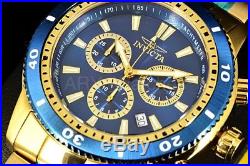
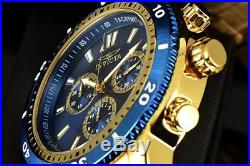
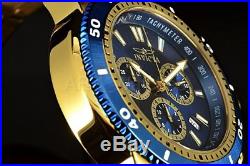
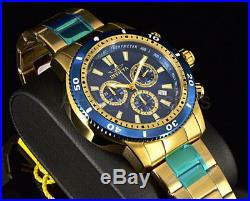
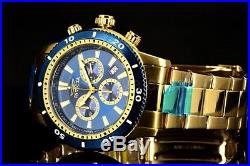
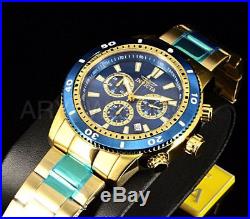
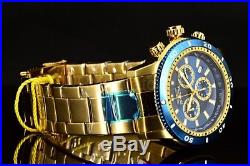
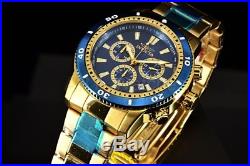
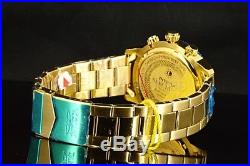
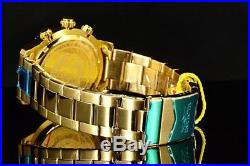

Invicta Men's 45mm Sport Swiss 5030. D Chronograph 18K Gold IP Blue Dial SS Watch. Seize the day with Invicta's Sport! The gold-tone option shows a gold-tone stainless steel case with a blue unidirectional rotating bezel. The rose-tone option shows a silver-tone stainless steel case with a rose-tone unidirectional rotating bezel. The round dial shows in blue on the gold-tone option and silver-tone on the rose-tone option. Gold-tone or rose-tone luminous Tritnite accented index hour markers appear in all hour positions.
The Tritnite accented hands rotate in the coordinating color. A 30 minute subdial rests near 10:00, a seconds subdial sits near 2:00 and a date window appears between 4:00 and 5:00. A 12 hour subdial shows above 6:00 as a tachymeter appears along the outer dial. This function is propelled by a Swiss Parts Ronda 5030. The gold-tone option uses a gold-tone stainless steel bracelet while the rose-tone option displays a silver-tone bracelet with rose-tone accented inner links.
Both secure with deployant clasps. Exude style and class with Invicta's Sport! Maintaining Water Resistance Every year or so, a watch's water resistance needs to be checked to ensure it is performing to its full potential. Check the packings around the crown and back of the case. These are intended to seal the watch from water and dust. Over time, they may lose their elasticity and need to be replaced. Cracks in the crystal can also result in losing water resistance. A professional inspection can determine if any scratches or cracks are letting in any moisture. Bracelet: Stainless Steel Movement: Swiss Parts Ronda 5030.D Quartz Chronograph Crystal: Flame Fusion Crown: Push/Pull w/ Function Pushers Clasp: Deployant Bracelet Measurements: 9-1/4 L x 22mm W Case Measurements: 45mm Case Thickness: 12-1/2mm Weight: 6 oz Water Resistance: 10 ATM - 100 meters - 330 feet. The item must be in its Original Condition, completely wrapped with plastic wraps, with tags attached to the watch with absolutely no damage to the watch or the box at all.
All Measurement given in the listing are approximate. WE WILL DEFINITELY DO WHATEVER IT TAKES WITHIN REASONABLE CAPACITY TO MAKE YOU HAPPY & EARN YOUR BUSINESS AND ASSURE YOU TO BE OUR RETURN CUSTOMER.Analog-Digital Display (ana-digi): Watch that shows the time by means of hour and minute hands (analog display) as well as by numbers (digital display). Arabic Numerals: Popular counterpart to Roman numerals consisting of 1,2,3, etc; Became popular during the 18th century and typically allow for more space on the dial for complications.
ATM: Commonly used measurement in water resistance; Stands for "atmospheres" or the amount of pressure a watch can withstand before leaking; One atmosphere is equal to 10 meters of water pressure. Automatic Movement: Type of movement where the mainspring is wound via the movement of one's own arm; Movement of the arm causes the rotor to rotate, which in turn winds the mainspring; Similar to mechanical movements, except winding is not manual. Bezel: Retaining ring surrounding the case and securing the crystal; Sometimes incorporates unidirectional or ratcheting movements, as well as additional benefits such as chapter markers. Case: Timepiece's container; Protects the movement from dust, dampness and injury; Common case shapes are round, tonneau, rectangular and square. Chronograph: Timepiece capable of both timekeeping and stopwatch functions; Chronographs are a unique and valued complication due to their ability to measure increments of time.
Chronometer: High-precision timepiece that has been tested and is certified to meet precision standards; Chronometer watches often come with certificates indicating their certified status. Complication: Any feature added to the timepiece that does not indicate hours, minutes or seconds. Popular complications include chronographs, tachymeters, date windows and exhibition backs. Crown: Small, cap-like device located on the side of a case that allows the user to set time or manually wind watch. Crystal: Transparent cover on a watch face that gives view of the dial; Sapphire and mineral are the most common crystals used today. Date Window: Reveals the numeric day of a given month. Deployant: Type of clasp that keeps the closing mechanism hidden, creating an uninterrupted look for your bracelet or strap.Dial: Plate beneath the crystal showcasing the timepiece's features; Sometimes referred to as the face of a timepiece, the dial indicates hours, minutes and seconds, as well as complications such as date windows and sub-dials. Dual Deployant: Similar to a deployant clasp, except it uses two hinges to fasten or open, as opposed to one.
Dual Time Zone: Timepiece that simultaneously gives time in two time zones. Exhibition case: Unique complication wherein a crystal is implemented into the case back, allowing view of the timepiece's movement.
Greenwich Mean Time: Refers to the Royal Observatory in Greenwich, England where mean time is kept; Located at the prime meridian of the world, GMT is thought of as "the world's time". Jewels: International term referring to the rubies, sapphires or other gemstones used as bearings in a watch movement; These bearings are set to reduce friction in a movement and help the delicate parts of the movement work smoothly and with great precision.
Mechanical Movement: Type of movement where the winding crown is used to power the movement; Needs to be manually wound after an elapsed period of time; Sometimes accompanied by a exhibition back to display its old-fashioned sensibilities. Mineral Crystal: Technical term for glass; Standard crystal used in timepieces today. Minute Repeater: Timepiece that sounds hours, quarters and minutes as requested. Moon Phase: Complication on a timepiece that displays the various stages of the moon; Stages include new moon, first quarter, full moon and last quarter.
Mother-of-Pearl: Dial material that has been cultivated from the inside of certain shells; Provides an iridescent surface and gives timepieces a rich aesthetic. Movement: Assembly making up the principal elements and mechanisms of a watch or clock; Includes the winding and setting mechanism, the mainspring, the train, the escapement and the regulating elements. Perpetual Calendar: Complication that exhibits the days in a Gregorian calendar, the most common calendar used today; Automatically adjusts to months with different amounts of days in them. Power Reserve: Time a watch will continue running based on the movement's residual winding of its mainspring; In quartz and digital watches, this can also refer to the amount of energy left in the battery. Push Button Dual Deployant: Similar to deployant clasps, with the addition of two small hidden push buttons that spring your clasp open.Quartz Movement: Most common type of movement used in modern timepieces; Vibrating at a high frequency and placed under an electric current, quartz movements provide accurate time without the need to wind. Repeater: Complex watch mechanism that sounds hours, quarters or minutes, or repeats them on request; Originally designed to help the wearer to tell the time in the dark. Retrograde: Hour, minute, second or calendar hand that moves across a scale and resets to zero at the end of its cycle.
Sapphire Crystal: High-end crystal that adds greater value to a timepiece; The only natural substance able to harm a sapphire crystal is a diamond. Skeletonization: Cutting away unnecessary metal from the movement to allow the wearer to actually see through the movement; Any part that is not needed is carved out, leaving only the movement's skeleton.Subdial: Smaller dials located on the main dial of a timepiece; Used to measure seconds, minutes or days. Tachymeter: Popular complication that measures distance based on speed; Typically located along the outer rim of a dial. Water resistant: Watches described as simply "water resistant" can handle light moisture, such as a rainstorm or splashes from a sink, but they should not be completely submerged in water for any length of time; A commonly used measurement in water resistance is ATM, which stands for "atmospheres" or the amount of pressure a watch can withstand before leaking. About Stainless Steel: Also called corrosion resistant steel, stainless steel is a steel alloy with added iron and chromium.
The metal is rust-resistant, durable and highly lustrous. It has a similar appearance to platinum and polishes to a glistening sheen. Any scratches that may occur from day to day wear can be easily buffed away without endangering the piece.
Please note, however, if the stainless steel is plated with another metal, the plating can wear off if rubbed excessively against hard surfaces. Stainless steel was first recognized in France in 1821 by metallurgist Pierre Berthier.
After several corrosion-resistance related discoveries and patents in Europe and the United States, Harry Brearley in England discovered a modern blend of stainless steel alloy. When it was announced by The New York Times in January of 1915, he was officially credited with the invention of this impressive modern metal. All water-resistant watches must have the crown and function pushers completely pushed or screwed into the watch case in order to be water resistant to the specified depth. When a watch battery is changed, the gasket and seals must also be checked and/or replaced to maintain water resistance.Water-Resistant: Watch can withstand an accidental splash of water (like rain) but should not be worn while washing hands, bathing, or swimming. Water Resistant 3 ATM (3 atmospheres, 3 bars, 99 feet): Watch can withstand daily activities and hand washing but is not intended to be submerged under water; Should not be worn while swimming or bathing.
Water Resistant 5 ATM (5 atmospheres, 5 bars, 165 feet): Watch can withstand daily activities and may be worn swimming; Not intended for water activities like snorkeling or diving in a pool; Long-term exposure to water submersion is not advisable. Water Resistant 10 ATM (10 atmospheres, 10 bars, 330 feet): Watch can withstand daily activities and may be worn swimming and snorkeling; Not intended for diving to depths outside the limits of a swimming pool; Long-term exposure to water submersion is not advisable. Water Resistant 20 ATM (20 atmospheres, 20 bars, 660 feet): Watch can withstand daily activities and may be worn for most types of diving, with the exclusion of diving that requires helium gases.
Water Resistant 30 ATM (30 atmospheres, 30 bars, 990 feet) & Greater: Watch can withstand daily activities and may be worn for all types of diving and water activities. The item "Invicta Men's 45mm Sport Swiss 5030. D Chronograph 18K Gold IP Blue Dial SS Watch" is in sale since Tuesday, October 31, 2017. This item is in the category "Jewelry & Watches\Watches, Parts & Accessories\Wristwatches".
The seller is "ary_watches" and is located in Edison, New Jersey. This item can be shipped worldwide.
- Gender: Men's
- Water Resistance: 100 Metres / 10 ATM
- Model: Invicta Sport Specialty
- Modified Item: No
- Watch Shape: Round
- Style: Luxury: Sport Styles
- Case Color: Gold
- Case Material: Stainless Steel
- Movement: Swiss Parts Ronda 5030.
D Quartz Chronograph
- Band Material: Stainless Steel
- Water Resistance Rating: 100 m (10 ATM)
- Features: Water Resistant
- Year of Manufacture: 2010-Now
- Case Finish: Matte
- Band Type: Bracelet/Link Band
- MPN: 1205
- Band Color: Yellow Gold
- Age: Modern (2000-present)
- Age Group: Adult
- Display: Analog
- Lug Width: 12-1/2mm
- Brand: Invicta
- Case Size: 45mm
- Face Color: Blue
